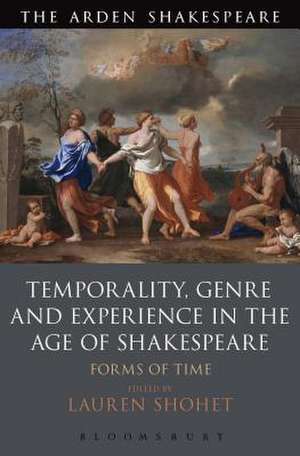Temporality, Genre and Experience in the Age of Shakespeare: Forms of Time
Editat de Lauren Shoheten Limba Engleză Paperback – 21 aug 2019
| Toate formatele și edițiile | Preț | Express |
|---|---|---|
| Paperback (1) | 230.34 lei 43-57 zile | |
| Bloomsbury Publishing – 21 aug 2019 | 230.34 lei 43-57 zile | |
| Hardback (1) | 596.28 lei 43-57 zile | |
| Bloomsbury Publishing – 21 feb 2018 | 596.28 lei 43-57 zile |
Preț: 230.34 lei
Nou
Puncte Express: 346
Preț estimativ în valută:
44.08€ • 45.79$ • 36.62£
44.08€ • 45.79$ • 36.62£
Carte tipărită la comandă
Livrare economică 03-17 februarie 25
Preluare comenzi: 021 569.72.76
Specificații
ISBN-13: 9781350126558
ISBN-10: 1350126551
Pagini: 344
Ilustrații: 15 bw illus
Dimensiuni: 129 x 198 x 23 mm
Greutate: 0.34 kg
Editura: Bloomsbury Publishing
Colecția The Arden Shakespeare
Locul publicării:London, United Kingdom
ISBN-10: 1350126551
Pagini: 344
Ilustrații: 15 bw illus
Dimensiuni: 129 x 198 x 23 mm
Greutate: 0.34 kg
Editura: Bloomsbury Publishing
Colecția The Arden Shakespeare
Locul publicării:London, United Kingdom
Caracteristici
Offers
a
range
of
readings
of
texts
by
both
Shakespeare
and
his
contemporaries
Notă biografică
Lauren
Shohetis
Luckow
Family
Professor
of
English
at
Villanova
University,
USA
and
the
author
ofReading
Masques:
The
English
Masque
and
Public
Culture
in
the
Seventeenth
Century(2010).
Her
writing
on
early
modern
poetry,
drama,
and
form
has
focused
on
Milton,
Marvell,
Jonson,
and
Shakespeare,
appearing
in
such
journals
asPoetics
Today,Milton
Studies,Shakespeare
Studies,
theJournal
of
Early
Modern
Cultural
Studies,
and
theYearbook
of
English
Studies.
She
is
coeditor
ofGathering
Force:
British
Literature
in
Transition
1557-1623and
of
the
first
volume
of
the
forthcoming
three-volumeBritish
Literature
in
Transition
1557-1680(general
editor
Stephen
Dobranski,
2017).
She
has
held
fellowships
and
appointments
from
the
National
Endowment
for
the
Humanities
(USA),
the
Folger
Shakespeare
Library,
the
Huntington
Library,
and
Freiburg
Institute
of
Advanced
Studies
(Germany).
Cuprins
List
of
IllustrationsNotes
on
ContributorsAcknowlegementsNote
on
Texts1.
Introduction:
Forms
of
Time
(Lauren
Shohet,
Villanova
University,
USA)Part
One:
Illuminating2.
Shakespeare's
theater
of
comic
time
(Kent
Cartwright,
University
of
Maryland,
College
Park,
USA)3.
Suspense
Revisited:
The
Shared
Experience
of
Time
(Raphael
Falco,
University
of
Maryland,
USA)4.
"In
the
Course
and
Process
of
Time":
Rupture,
Reflection
and
Repetition
inHenry
VIII(Philip
Lorenz,
Cornell
University,
USA)
Part
Two:
Synthesizing5.
IsHenry
Vstill
a
history
play?
(Andrew
Griffin,
University
of
California,
Santa
Barbara,
USA)
6.
Allusion,
Temporality,
and
Genre
inPericlesandTroilus
and
Cressida(Lauren
Shohet,
Villanova
University,
USA)
Part
Three:
Misaligning
7.Love's
Labours
Lost
and
the
Layered
Temporality
of
Poetic
Reception(Matthew
Harrison,
Albion
College,
USA)
8.
TimingThe
Knight
of
the
Burning
Pestle:
Genre,
Style,
and
Performance
(Lucy
Munro,
King's
College,
London,
UK)9.
Time,
Tragedy
and
the
Text
ofAntony
and
Cleopatra(Rebecca
Bushnell,
University
of
Pennsylvania,
USA)Part
Four:
Proliferating10.
"The
Death
of
Fathers":
Succession
and
Diachronic
Time
in
Shakespearean
Tragedy
(William
C.
Carroll,
Boston
University,
USA)11.
Passionate
Time
in
Elizabeth
Cary'sThe
Tragedy
of
Mariam(Lara
Dodds,
University
of
Mississippi,
USA)
12.
Future
Histories
inKing
Lear(Meredith
Beales,
University
of
Victoria,
Canada)
Part
Five:
Pleating13.
Last
Judgement
to
Leviathan:
The
Semiotics
of
Collective
Temporality
in
Early
Modern
England
(Robin
Scott
Stewart,
University
of
California,
Irvine,
USA)14.Cymbeline,
Janus,
and
Folded
Time
(Valerie
Wayne,
University
of
Hawaii,
USA)NotesIndex
Recenzii
A
luminous
collection
of
essays
that
explore
Shakespeare's
capacity
to
score
time
like
music.
Offers a step in a new direction for the analysis of early modern drama. The collection contains strong and rich studies on the topics of reception, experience, and formal considerations ... The work contained in each essay will be valuable both to those interested in themes of time in Shakespeare's age, or to scholars looking for insights into the individual plays under discussion.
Offers a step in a new direction for the analysis of early modern drama. The collection contains strong and rich studies on the topics of reception, experience, and formal considerations ... The work contained in each essay will be valuable both to those interested in themes of time in Shakespeare's age, or to scholars looking for insights into the individual plays under discussion.
